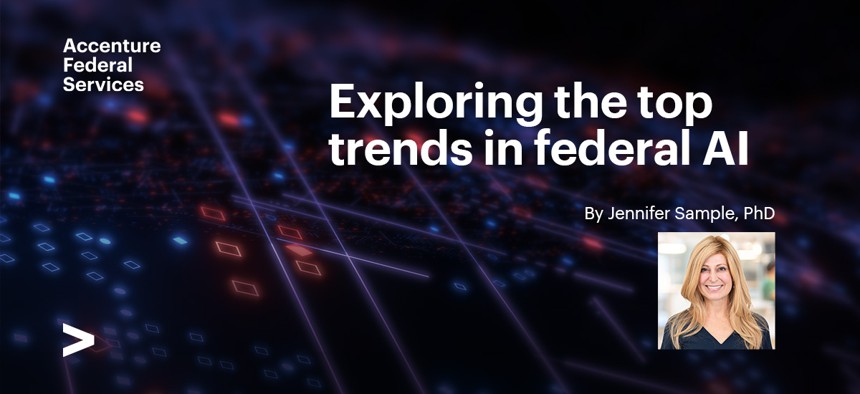sponsor content What's this?

Four Building Blocks for the Next Era of Federal AI
From data-led transformations to democratized AI, new trends are emerging in federal agencies’ use of AI that can help drive greater long-term success.
Presented by
Accenture Federal Services

The stakes for the federal government surrounding its adoption of artificial intelligence (AI) are immense. Beyond the scale, diversity, and criticality of its various missions, the government is arguably the largest data holder in the world. Get it right and the federal government can lead the world in using AI to improve health outcomes, solve the climate crisis, lift living standards, and so much more.
How close are we to delivering on AI’s full potential? Let’s consider the current state of play:
- AI advancement over the past few years has been nothing short of remarkable — we’re truly in the golden age of progress when it comes to AI.
- These advancements have demonstrated the clear value AI can offer to enterprises; soon, it will be an integral aspect of how most enterprises operate.
- Federal agencies have been leaders in defining the responsible, ethical, and appropriate use of AI.
- But though federal agencies have made progress in their use of AI, truly embedding it within federal operations will require more flexible, integrated, and comprehensive approaches — from rethinking how data is organized to who can execute with AI and more.
Based on our work across the full spectrum of federal missions — from citizen services and health to defense and national security — we have identified four emerging building blocks federal agencies can leverage to build a strong foundation for long-term AI success.
1. Data-Led Transformation
Across the federal government, tech ecosystems are becoming formless. Today, there’s almost no clear demarcation between the applications and data people are using, which makes it more important than ever to gain control over your data. And, to do that, you first need to gain control over the ecosystem, prioritizing data as a strategic asset that can be accessed, connected, and governed at scale. You also need to think about privacy concerns — namely, who should have access to what in an organization. Getting this right requires a comprehensive approach to data, from strategy and planning to execution and operations. That's what we call data-led transformation.
Data-led transformation is a critical piece of the AI puzzle because you need to make sure that when you build solutions to access your data, for the long term, you’re doing it responsibly. So the first step in any responsible data-led transformation is to fully understand where your data sits and how you want to use it. That often necessitates modernizing some infrastructure to present it in a more responsible, governed, secure, and less expensive environment, enabling you to use the right data more easily at the right time and for the right use case. Typically, transferring workloads, or data structures, off of legacy platforms like the mainframe to the cloud is an important part of any data-led transformation.
2. Democratization of AI
More democratized AI can break down barriers between the business and the IT sides of an agency — thereby helping to close the execution gap. In other words, getting AI into more people’s hands, more quickly, can significantly increase the speed and decrease the cost with which insights can empower decision-makers and improve mission operations.
Of course, in the past, if you wanted to directly use AI, you needed to have a PhD and programming skills to manually program algorithms to build the prediction and the pipeline that you want. Today, with the advent of low-code environments and new approaches to data engineering, citizen data scientists can work alongside classically trained data scientists and engineers, using AI pipelines that can be built with drag-and-drop precision and ease. This can help organizations overcome skills gaps and ultimately see more immediate and actionable value from AI.
3. Distributed Intelligence
In the past five to 10 years, we've seen a massive increase in available computing power. Plus, with the addition of 5G and Wifi 6, network speeds have gotten even faster. Enabled with AI, this increasingly distributed intelligence can give federal agencies powerful new capabilities. We’re getting much faster at capturing data, interrogating data, making predictions, and gaining forward-looking insights, all outside the traditional IT perimeter.
The potential for these autonomous, intelligent systems is immense — think robots, self-driving vehicles, drones, virtual agents, and wearables. For example, our population is rapidly aging, both in the U.S. and globally. However, we don’t have enough caregivers to enable this entire population to continue to live independent, dignified, fulfilling lives. Assistive robots and similar systems can fill this void, handling day-to-day tasks and supporting mobility, proactively monitoring health and well-being, and even offering companionship. The combination of smarter, smaller, and more powerful computing — combined with faster communications protocols — enables systems that can independently sense, learn and respond with confidence.
4. Intelligent Platforms
These emerging trends in AI all bring with them a range of new opportunities, but they also bring complications. For agencies to most effectively embrace them, we need intelligent platforms that pull them all together. Already, the government is using many low-code AI development platforms, such as Salesforce, Pegasystems, and ServiceNow, all enabled by the rise of cloud and containerization.
Platform-centric approaches increasingly allow agencies to narrow the skills gap between different stakeholders involved in a process. They can marry procedural logic with declarative logic, or machine learning and predictive logic, increasing the ability to transact and execute decisions within the same platform.
The future of AI is agile and flexible and, in many ways, it’s already here. By exploring and executing on these four trends, federal agencies can receive greater value from their data and work toward harnessing AI’s full potential.
Interested in learning more about how AI will impact the future of government? Stay tuned for more content here from our team at Accenture Federal Services. In the coming weeks, we’ll be publishing in-depth articles on each of these four trends. I’d love to hear your questions and thoughts on what’s working well in your agency; please connect with me on LinkedIn.
Jennifer Sample, PhD – Managing Director, Accenture Federal Services, Applied Intelligence Growth & Strategy Lead
This content is made possible by our sponsor, Accenture. The editorial staff of GovExec was not involved in its preparation.
NEXT STORY: GovExec TV: Five Questions with David Alexander






